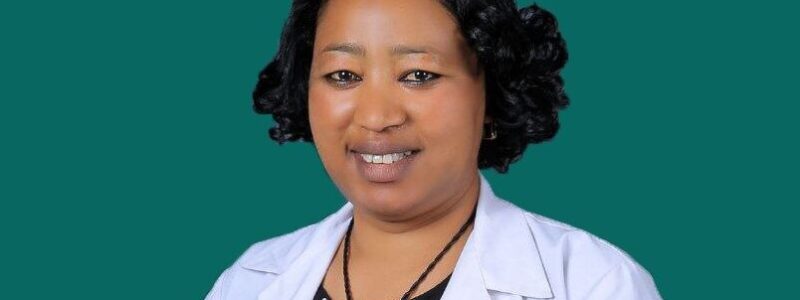S/r Hana Abera is TB/HIV team leader at Akaki Health Center in Addis Ababa. A team of experts from the national TBL program have visited the health center in April 2022 while they were conducting TBL catch up campaign to find missed TB cases. Akaki is one of the 240 Woredas selected all over the country to conduct TB catchup campaign. The aim of the campaign is to find missed TB cases in the community due to COVID-19 pandemic, conflict and displacement to catch the national Target. The campaign was organized with financial support from the Global Fund COVID-19 mitigation grant. The campaign relied on retrospective contact tracing of pulmonary TB patients registered in the past 2 years, TB high risk groups including displaced people, urban slum dwellers, mining communities and the like. The first strategy didn’t work well in Addis Ababa as tracking of index TB cases was a challenge.
S/r Hana and the HC management team decided to focus on other strategies, like conducting active TB case search among urban slum dwellers, factory workers and homeless communities which is relatively common in that area. About 3000 more TB cases were identified in the community outreach TB screening campaign nationwide. Among the total TB cases identified by the campaign in the catchment of Akaki health center, 3 homeless physically challenged bacteriologically positive TB cases were refused to start their treatment during pre-treatment patient counseling. The TB Clinic staff and the health center team was shocked by the news. One of the patients was identified around the holly water sites and the other two were on the street, two of them have unresolved sever bullet injuries. All of them are living as a street beggary mostly moving around churches. All of them firmly refused the TB treatment plan.

There is a strong belief in the community that “TB drugs have a devastating health consequence if taken without adequate meal/high protein diet”. One of the patients reported as “Being a beggar with disability (impaired movement), I am not sure whether food is available for tomorrow or not, no one knows where the next meal comes from, it is so uncertain, so why should I start TB treatment today and interrupt tomorrow or die from side effects.”
S/r Hanna tried her level best to convince them, she even allows them to take the medicines in the evening and she promise to take the daily dose wherever they will be, but all instantly refused all options as they don’t have cell phone and permanent place to stay. The health center management team also consulted civil society organizations to explore possibilities of shelter and meal to homeless TB patients. However, no CSO is dealing with adult male patients in the area and only destitute female and children TB patients were connected to Meseret Charity Organization.
There was no choice left for S/r Hanna and her colleagues, but to prepare launch boxes every morning for their TB patients as the last resort. The three TB patient took their treatment along with the lunch box in the health center. By January 2023, all of the TB patients have completed their six months standard TB treatment and declared cured. S/r Hana even further supported one of the patients to resolve his sustained injury and to remove the bullet inside him by connecting him to Tirunesh Beijing Hospital.
The unintended consequences of active case finding
Though the effort of S/r Hanna and her team is amazing and touchy, it is worrisome. What would they do if they identify more infectious TB cases with similar scenarios? The experience cannot be sustained and hard to considered as strategy as it is unbearable for the health professionals. The situation seriously challenged their professional integrity and moral values. S/r Hana Abera a former urban health extension worker and now a health officer took the TB care one step ahead and showed us the policy loophole and the future directions to End TB in Ethiopia. We were not prepared for such scenarios during the planning stage of the campaign. This is the unintended consequence of active TB case finding. S/r Hana represents thousands of humble health professionals all over the country. The national TBL and other lung diseases program acknowledges the efforts made by S/r Hana, the staff and the management of the Akaki health center.
The situation can be more exacerbated in other part of the country; we have cases in Afar that regular TB patients fight with TB clinic staffs for nutritional supplement assigned for drug resistant TB patients. Bacteriological positive TB patients couldn’t pay for transport fee of their extended family members eligible for TB screening and initiation of TTP.
The 2014 EFY National report indicated that 42% of registered TB patients had severe/ Moderate malnutrition. Nutrition and transportation, accommodation and meal for homeless and destitute TB patients, livelihood support and income generating and training opportunity for cured TB patients and households affected by TB is badly needed to halt TB transmission in Ethiopia. TB patient support should come as one of the critical discussion point and strategic direction in the upcoming NSP and National guideline revision to end TB.
School feeding program in Addis Ababa and other part of the country has shown us the possibility and has been registering tremendous benefits. The combined effort of the government, civil societies, private sector bilateral and multilateral partners have the same potential to solve the issue of not more than 100,000 poor TB patients in Ethiopia.
It is doable!
By; Fasil Tsegaye








